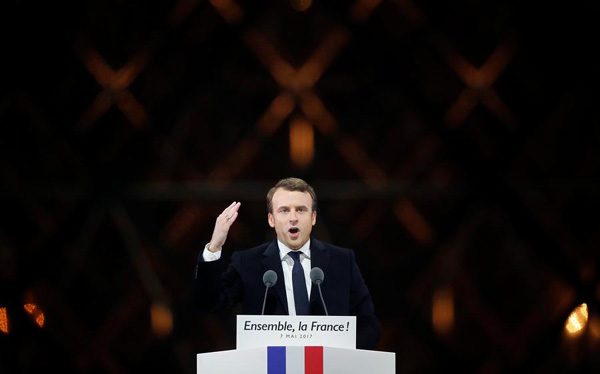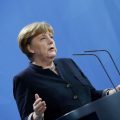
BRUSSELS – The election of Emmanuel Macron as French president on Sunday has brought relief to some European allies.
By defeating the National Front’s Marine Le Pen, the far-right one who had threatened to take France out of the European Union (EU), the centrist’s emphatic victory offers comfort to those who had feared another populist upheaval would follow Britain’s vote to quit the EU.
Macron’s win is certainly good news for political supporters of the European project as his program focuses on a deeper integration and better cooperation between the various countries in the EU.
Macron has consistently reasserted the European idea and raised the possibility that France and Germany will conjure a revival of European idealism.
German Chancellor Angela Merkel, through her spokesman, immediately hailed Macron’s win as a “victory for a strong and united Europe.”
Belgian Prime Minister Charles Michel said Macron’s victory was also a “clear rejection” of a “dangerous retreat plan for Europe.”
After the victory of Prime Minister Mark Rutte over far-right candidate Geert Wilders in Dutch election, and the recent collapse of the eurosceptic UK Independence Party in the local elections in Britain, France is opting for a “project geared towards better Europe,” Michel reckoned.
Macron offers a pro-business, pro-Europe, outward-looking and optimistic vision. He has been among those who advocate the creation of a eurozone budget to be controlled by a eurozone finance minister, and the floating of Eurobonds to boost economic convergence and narrow the EU’s north-south gap.
Macron’s pro-EU beliefs pose potential problems for British Prime Minister Theresa May and her Brexit negotiators. He does not favor a hard Brexit, but will be a tough negotiator in British talks to leave the EU, according to the French president-elect’s chief economic adviser Jean Pisani-Ferry.
Ferry said Britain and Europe shared “mutual interest” in maintaining economic prosperity.
Last year, Macron reacted with dismay to the prospect of Britain leaving the EU, describing the referendum result as a “crime” for which Britain should be punished by a “total exit.”
As supportive of the EU as he is, Macron has also warned he would consider pulling France out of the EU if the bloc does not reform.
Denis MacShane, former Europe minister under British ex-prime minister Tony Blair, said, “Macron has put the need to reform and re-energize Europe at the forefront of all his speeches and at his election meeting.”
“He has been very hard on Brexit, describing it as a “crime” and saying there can be no concessions to the UK which must not be seen to benefit from Brexit.” Giles Merritt, the highly respected Brussels-based EU commentator, said, “Winning a dramatic election victory without the support of a conventional party and with no Members of Parliament points to some significant shifts in France’s political landscape.”
Next month’s legislative elections for the National Assembly will give a clearer guide. If the candidates who will campaign under the banner of Macron’s new En Marche (On The Move) movement become a substantial parliamentary bloc, then France’s new president will indeed be a trend-setter, said Merritt.
But a setback for populism doesn’t necessarily mean its defeat. Macron’s pro-European stance as a presidential candidate now needs to be endorsed by French voters in the coming round of parliamentary elections, and then turned into solid EU policies.


